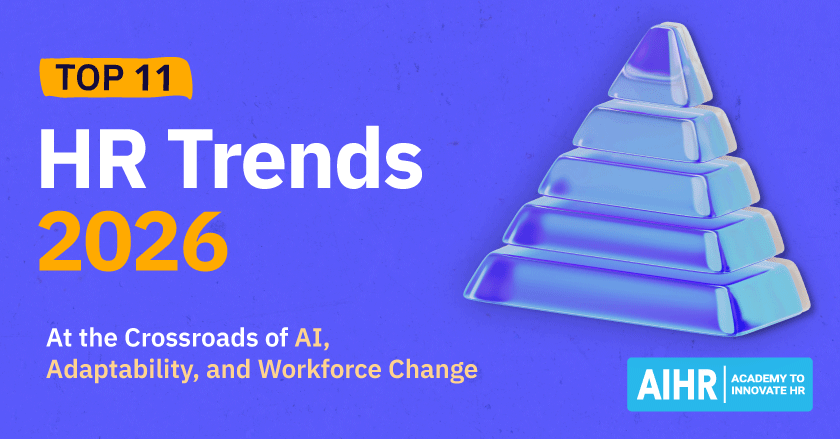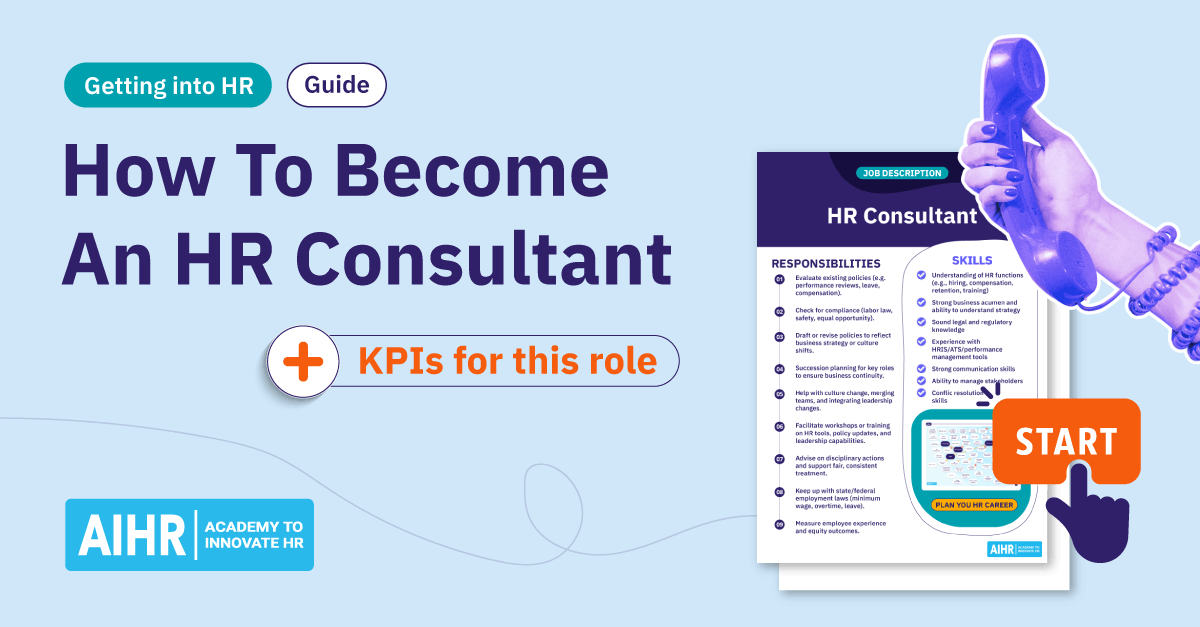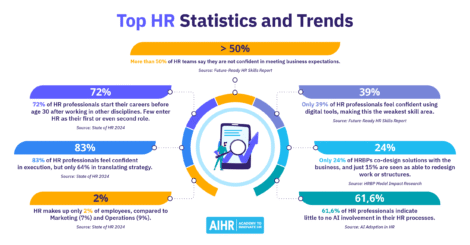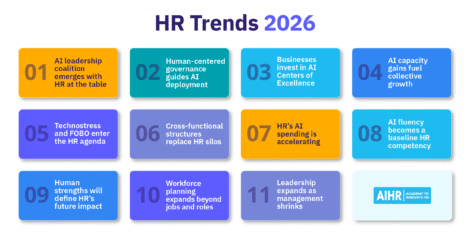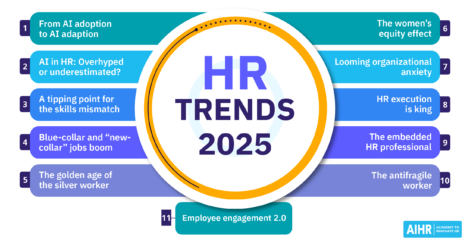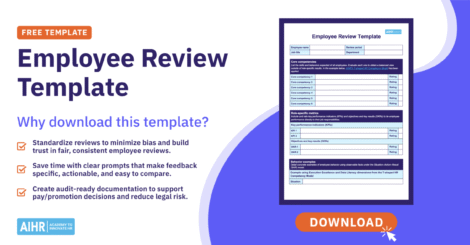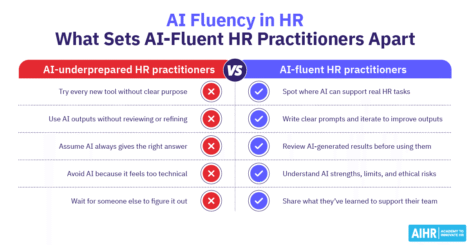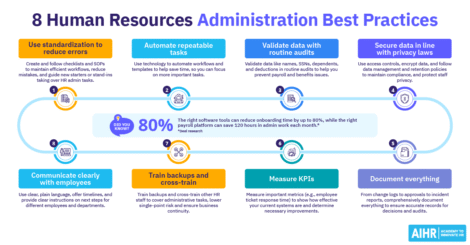An HR Consultant helps organizations translate strategy into effective people practices. They identify people’s problems, create practical solutions, and turn strategy into daily habits. The role sits between leaders, HR, and employees, bringing objectivity, structure, and momentum to organizational design, performance, DEIB, change, and compliance.
This article explains what the role involves, how to become an HR Consultant, the skills and qualifications you need to do well in this position, and which AIHR certificate programs can help you upskill and advance in this field.
Contents
What is an HR Consultant?
HR Consultant job description
Roles and responsibilities of an HR Consultant
Qualifications for an HR Consultant role
Skills and competencies for an HR Consultant role
Average HR Consultant salary
KPIs for this role
Potential career path for an HR Consultant
Key takeaways
- HR Consultants turn strategy into people practices that deliver measurable outcomes, bridging leaders, HR, and employees.
- Their core toolkit consists of HR audits, policy/process design, workforce planning, change management, compliance, and DEI.
- HR Consultants can build capability with SHRM, ATD, and DEI/analytics credentials, plus AIHR programs to add business acumen and a consulting mindset.
- They can prove value with KPIs (e.g., retention, compliance, DEI) and quantified wins; as well as run scoped projects and set a six- to 12-month growth plan.
What is an HR Consultant?
An HR Consultant advises organizations on optimizing their people practices — hiring, performance, compensation, culture, compliance, and strategic workforce planning — so HR supports business goals. They may be internal (embedded in the company, often partnering with leadership and HR) or external (independent or with a consulting firm).
However, in both cases, they bridge the gaps among three groups: leadership, HR teams, and employees. Good HR Consultants bring objectivity — they assess what’s working, identify gaps, recommend practical improvements, and help implement change. Their work is strategic and outcome-driven, not just administrative.
HR Consultant job description
An HR Consultant provides expertise in HR strategy, operations, and compliance to improve business performance and employee experience. They assess current HR practices for effectiveness, consistency, and compliance and design policies, operating procedures, and governance. They also guide recruitment, talent development, and retention.
Roles and responsibilities of an HR Consultant
Here are the roles and responsibilities of an HR Consultant:
- Evaluate existing policies (e.g., employee performance reviews, leave, compensation).
- Check for compliance (labor law, safety, equal opportunity).
- Measure effectiveness (time to hire, turnover, engagement)
- Draft or revise policies to reflect business strategy or culture shifts.
- Define clear procedures, ownership, and metrics.
- Succession planning for key roles to ensure business continuity.
- Help with culture change, merging teams, and integrating leadership changes.
- Facilitate workshops or training on HR tools, policy updates, and leadership capabilities.
- Advise on disciplinary actions and support fair, consistent treatment.
- Keep up with state/federal employment laws (minimum wage, overtime, leave).
- Reduce legal risk through training, processes, and documentation.
- Embed inclusive practices in hiring, promotion, and rewards, then measure employee experience and equity outcomes.
Build the skills you need to be an effective HR Consultant
To become a skilled, well-rounded HR Consultant, you must master core HR, make data-driven decisions, communicate clearly, influence stakeholders, and lead change.
✅ Shape business and HR strategy with structure and impact
✅ Consult with confidence on complex, high-stakes challenges
✅ Lead internal HR transformation, digital change, and HR operating model redesign
✅ Use HR metrics, KPIs, and OKRs to measure success and demonstrate strategic value
Learn at your own pace with the online HR Consulting Certificate Program.
Qualifications for an HR Consultant role
To succeed as an HR Consultant, candidates need the right mix of education, certifications, and experience. Below are some common qualifications the role requires or prefers:
Educational requirements
Here are the minimum educational requirements for becoming an HR Consultant in the U.S.:
- Bachelor’s in HR, Business, Psychology, or related field
- Master’s in HR/OD/Business (preferred for senior or specialized roles).
Recommended certifications
Although optional, relevant certifications for the HR Consultant position can help boost your résumé. Here are some popular certifications:
- SHRM-CP or SHRM-SCP: These SHRM certifications signal validated, up-to-date HR expertise and strategic capability aligned to global standards.
- PHR or SPHR (HRCI): HRCI’s certifications demonstrate rigorous command of HR operations (PHR) or senior-level, strategy-focused leadership (SPHR).
- APTD or CPTD (ATD): ATD’s certifications can help prove you can design, deliver, and measure learning that moves business metrics, not just training hours.
Work experience
- Entry/junior consulting: Two to three years in HR Generalist or Specialist roles.
- Senior consulting: Five to 10 or more years with strategic impact or deep domain expertise.
Skills and competencies for an HR Consultant role
As an HR Consultant, you’ll want to cultivate the following skills and competencies. These are often what separate someone who can do the work from someone who can lead and influence it.
Role-specific skills
- Deep understanding of various HR functions and processes (e.g., talent management, performance management, C&B, employee relations, and recruitment)
- Business acumen to understand the business objectives and strategies of the organization in order to align HR practices with these goals
- Willing to continuously learn and stay up-to-date on the latest HR trends and practices to provide valuable insights and recommendations.
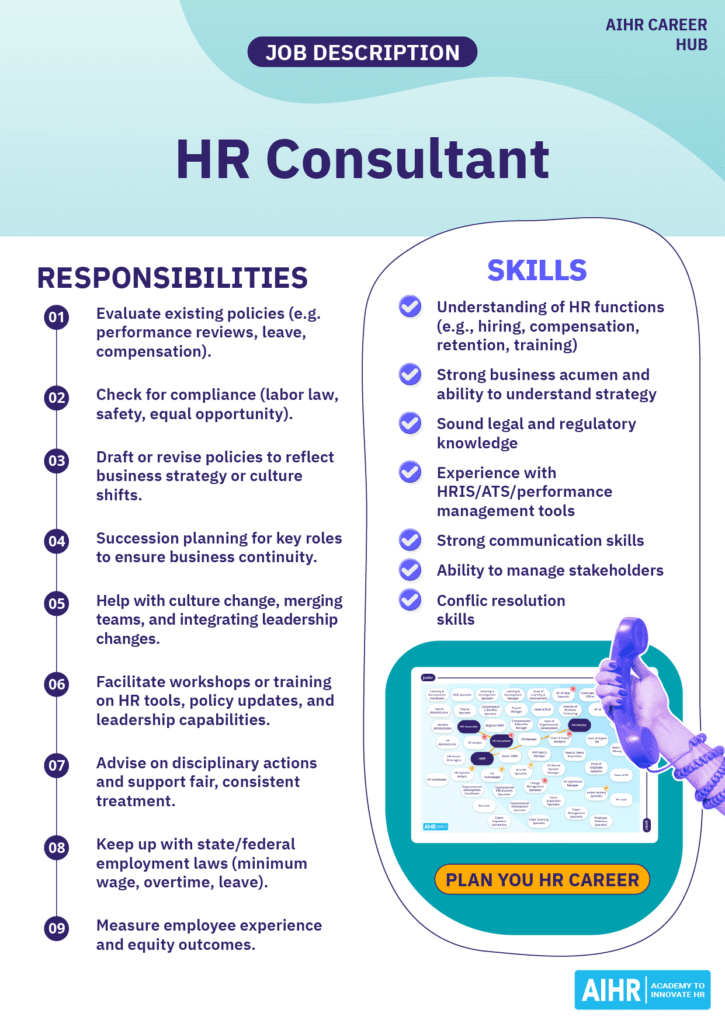
Technical skills
- Knowledge of employment law and regulatory compliance
- Proficiency with HR Software (HRIS, ATS, performance management tools)
- Data analysis and ability to work with and communicate HR metrics (turnover, time to hire, DEI metrics).
Soft skills
- Strong communication and presentation skills (can translate technical or policy information for non-HR audiences)
- Strategic thinking — able to see the big picture and anticipate future needs
- Emotional intelligence — conflict and change management, handling different personality types
- Adaptability to be able to work in different industries and company cultures.
HR career tip
Whenever possible, use specific metrics to highlight how you added value and delivered results at your previous and current organizations. Did you help decrease turnover or improve engagement scores? If so, by how much? Measurable outcomes spell out clearly your business impact as an HR Consultant, strengthening your value in this role.
Average HR Consultant salary
Compensation for HR consultants varies by experience, specialization, company size, industry, and location. Indeed states an approximate $72,000 average yearly salary for general HR Consultant roles, while Salary.com skews higher at about $138,000 (with many between $109,000 and $157,000).
Glassdoor, on the other hand, reports an average annual salary of around $132,000, with a broad spread ($100,000 to $176,000) by company and seniority. Senior internal HR Consultants and niche external specialists (e.g., rewards, M&A, analytics) often earn yearly salaries in the six figures.
KPIs for this role
- Completion of HR audits and recommendations for improvement.
- Development and implementation of HR policies and procedures that align with organizational goals and objectives.
- Success in attracting and retaining top talent.
- Development and implementation of competitive and equitable compensation and benefits programs.
- Resolution of employee relations issues in a timely and effective manner.
- Successful delivery of training programs and positive feedback from participants.
- Compliance with employment laws and regulations.
- Successful collaboration with other departments to develop and implement HR strategies.
- Analysis of HR data to identify trends and provide recommendations for improvement.
- Successful completion of special HR projects.
Potential career path for an HR Consultant
An HR Consultant’s career path commonly involves progressing internally from HR Generalist or Analyst to HR Consultant, then to HR Manager, and finally, Head of People Analytics. Some may progress further into leadership roles, such as HR Director or VP.
Externally, many start as Associate HR Consultants, deepen expertise in areas like DEIB, rewards, change, or HR tech, and move toward principal/partner or independent practice. Some pursue a specialization track (e.g., C&B, people analytics, organizational design, leadership development, or HR tech implementation) to increase their impact and fees.
Others may blend routes in hybrid roles, operating like internal consultants while taking on external projects. Check out the AIHR HR Career Map to help you plot skills, roles, and next moves.
AIHR certificate programs to consider
Here are specific AIHR certificate programs that align well with what HR Consultants need. Learn why each is relevant and at which stages of your career they may be most useful.
HR Consulting Certificate Program
The HR Consulting Certificate Program shifts you from traditional HR to a strategic, consultant mindset that enables you to spot trends, and drive innovation. It gives you practical tools (process cheat sheets, goal templates) to streamline projects and align with priorities. You’ll also learn business acumen, data literacy, and digital agility to help you deliver measurable value.
HR Generalist Certificate Program
The HR Generalist Certificate Program equips HR Consultants with end-to-end HR knowledge and practical tools, and helps them build a consultant mindset to spot trends and drive innovation. It also validates your expertise to boost credibility and business-aligned impact, and helps you apply current best practices to solve modern challenges and support growth.
HR Business Partner 2.0 Certificate Program
The HR Business Partner 2.0 Certificate Program is useful for mid-level HR professionals aiming to operate as strategic advisors. In this program, you’ll learn business acumen, data literacy, and consulting skills that will help you align people initiatives with strategy, influence leaders, and deliver measurable outcomes across different functions.
HR career tip
Network to build your professional visibility. Join Human Resources associations, attend HR webinars, and get involved in HR or business partner groups and communities. You can also offer to lead or volunteer for internal special projects. These actions will increase your overall visibility as an HR Consultant, leading prospective employers to take notice of you.
Next steps
Focus on momentum, not perfection. Start with a quick skills gap check against the roles and competencies mentioned in this article, pick one learning path to close your biggest gap, and take on a scoped project where you can act like a consultant. This may include auditing a process, redesigning a policy, or running a change pilot with clear before/after metrics.
Then, make the results visible. Update your résumé and LinkedIn with outcomes, share wins with stakeholders, and set a six- to 12-month plan to heighten your expertise or begin to specialize. Small, measurable wins compound fast, so use them to build credibility and accelerate your move into (or up within) HR consulting.


